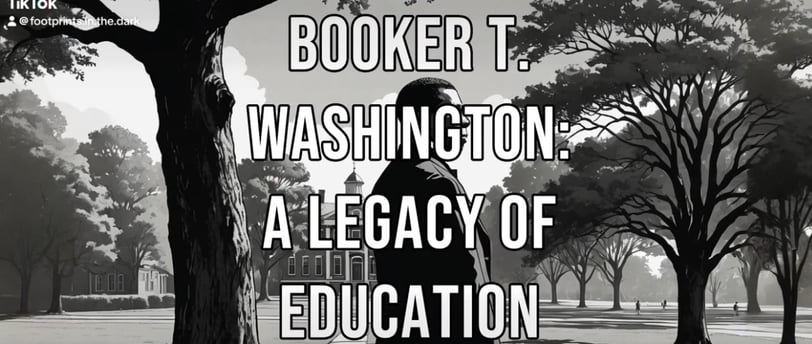The Visionary Behind Tuskegee's Legacy
Unlock the remarkable story of Booker T. Washington, a man who turned the adversities of his early life into a powerful legacy of education and empowerment. Born into slavery in 1856 Virginia, Washington's journey is one of grit and determination, as he transitioned from the harsh realities of laboring in salt furnaces and coal mines to founding the iconic Tuskegee Institute. Discover how he pioneered the concept of industrial education, advocating for practical skills as a means to achieve economic independence and uplift an entire race. This episode promises to offer a new perspective on how education can be a catalyst for societal change.
Footprints In The Dark
10/19/20243 min read


Booker T. Washington's life is a compelling narrative of resilience, vision, and strategic brilliance, and the podcast episode "From Slavery to Strategy: Washington's Educational Revolution" delves into these facets in great depth. Born into slavery in 1856 Virginia, Washington's journey from bondage to becoming a pivotal figure in education and empowerment is nothing short of remarkable. His early life was fraught with adversity, laboring in salt furnaces and coal mines, which ingrained in him a relentless work ethic and a belief in self-reliance. This formative period laid the foundation for his later accomplishments, including the establishment of the Tuskegee Institute, an institution that became synonymous with industrial education and economic independence.
Washington's vision for education was revolutionary. He championed the concept of industrial education, which emphasized practical skills like carpentry, bricklaying, and printing, over purely academic pursuits. He believed that economic independence was the true pathway to equality for African Americans in the post-Civil War South. This approach was not just about individual advancement but about uplifting an entire race. By equipping black Americans with marketable skills, Washington aimed to empower them to build their own economic futures. The episode vividly paints this picture, illustrating how the Tuskegee Institute started from humble beginnings in a church and grew into a beacon of educational empowerment.
The podcast episode also unpacks the complexities surrounding Washington's philosophies, particularly the Atlanta Compromise speech of 1895. Delivered at the Cotton States and International Exposition, Washington addressed a predominantly white audience in the Deep South, advocating for gradual progress rather than immediate social or political equality. His "cast down your bucket" message called for mutual sacrifice and cooperation, suggesting that black Americans should focus on self-reliance and skill development. This stance, while strategic, sparked significant debate. Many in the black community, including prominent figures like W.E.B. Du Bois, criticized Washington for what they perceived as an acceptance of racial subjugation.
Du Bois, a brilliant scholar and activist, completely rejected Washington's approach, advocating instead for full and immediate equality. The episode contrasts these two powerful figures, highlighting the divergent paths they proposed for achieving racial justice. While Washington played the long game, leveraging relationships with influential people and securing funding for Tuskegee, Du Bois urged for an uncompromising fight for rights. This discussion not only provides historical context but also invites listeners to reflect on the ongoing debates about the best strategies for achieving social change.
Washington's impact extended beyond his educational endeavors. Dining with President Teddy Roosevelt was a symbolic act that subtly shifted perceptions during the Jim Crow era. It demonstrated Washington's strategic acumen and his understanding of the importance of access to power for enacting change. Despite criticism, his efforts yielded tangible results, establishing a legacy that endures to this day. The Tuskegee Institute remains a testament to his vision, and his autobiography, "Up From Slavery," continues to inspire with its powerful narrative of resilience and determination.
The episode encourages listeners to grapple with the complexities of Washington's legacy, acknowledging that history is rarely clear-cut. Washington was both praised as a visionary and condemned as a sellout, illustrating the multifaceted nature of his contributions. This exploration of Washington's life challenges us to embrace the messiness of history and recognize that there are often multiple paths to progress. By examining the writings of both Washington and Du Bois, listeners are invited to see how different perspectives can clash and converge, offering a richer understanding of the fight for racial equality.
In conclusion, the podcast episode "From Slavery to Strategy: Washington's Educational Revolution" provides a nuanced exploration of Booker T. Washington's life and legacy. It invites us to reflect on the complexities of making change within a system rigged against you and to appreciate the enduring impact of Washington's vision for education and empowerment. By embracing these historical complexities, we gain a deeper understanding of the ongoing struggle for equality and the power of strategic thinking in achieving lasting change.
